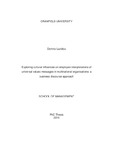JavaScript is disabled for your browser. Some features of this site may not work without it.
| dc.contributor.advisor | Kelliher, Clare | |
| dc.contributor.author | Lazidou, Domna | |
| dc.date.accessioned | 2011-07-25T15:53:11Z | |
| dc.date.available | 2011-07-25T15:53:11Z | |
| dc.date.issued | 2010-05 | |
| dc.identifier.uri | http://dspace.lib.cranfield.ac.uk/handle/1826/5718 | |
| dc.description.abstract | This thesis focuses on an increasingly popular, but little studied organisational communication practice, the deployment of corporate values messages as a means of ‘framing’ reality, and of achieving ‘shared meaning’ in multicultural workplaces, and asks if such practices, based on ethnocentric approaches to business communication, are likely to be effective in culturally diverse contexts. Using a business discourse perspective, and approaching culture as dynamic systems of meaning, the study presents a rich case of values communication in a European multinational, by exploring in detail the meanings employees derive from the organisational values messages, and the relationship between these meanings and the cultural context in which they are constructed. Findings point to two main conclusions: Firstly, that universal values messages do generate multiple employee meanings, but these do not derive from distinct cultural memberships, such as ethnicity or nationality, but rather from the complex interaction between message texts, organisational cultural frames and discourses and cultural identities constructed during interpretation by message users. This finding offers support for a non-essentialist approach to culture in intercultural business communication research, which locates culture not in distinct external influences on communicative action, but in a complex and holistic ‘interculturality’ - the process and outcomes of interacting dynamic cultures, cultural texts, and the communicative action itself.Secondly, findings show that, if the message texts trigger shared cultural frames, shared meanings will also emerge, despite apparent cultural diversity among message readers. This finding challenges the view of much current intercultural and cross-cultural communication scholarship, that the cultural diversity of business audiences is likely to render universal communication practices in multinational businesses ineffective. Instead, it suggests that explicit universal values texts in multinational organisations may indeed contribute to the generation of shared meaning, although this will be mediated by existing, implicit, cultural ‘texts’. | en_UK |
| dc.language.iso | en | en_UK |
| dc.publisher | Cranfield University | en_UK |
| dc.rights | © Cranfield University, 2010. All rights reserved. No part of this publication may be reproduced without the written permission of the copyright holder. | en_UK |
| dc.title | Exploring cultural influences on employee interpretations of universal values messages in multinational organisations: a business discourse approach | en_UK |
| dc.type | Thesis or dissertation | en_UK |
| dc.type.qualificationlevel | Doctoral | en_UK |
| dc.type.qualificationname | PhD | en_UK |
